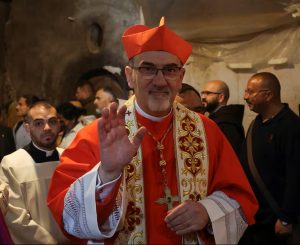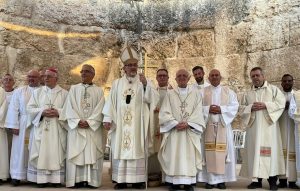His Beatitude Card.Pierbattista Pizzaballa Latin Patriarch of Jerusalem shared with us his life experience in the Holy Land.
Part II – And then, you had to change again. What came later?

Pierbattista Pizzaballa Latin Patriarch, Jerusalem
I was elected Custos of the Holy Land, so I had to leave the parish of Hebrew Catholics. Then, things changed dramatically. I remained a Custos for 12 years, very interesting years. I was 39 years old, when I became Custos, very young. I had to learn to become a father when I hadn’t had time to feel like a son. Also, I was moved from the Hebrew-Israeli context to a completely different context where I had to deal with Lebanon, Syria, Arab countries, Arab societies, and so on. But it was a good lesson for me, actually.
As Custos, we have more freedom than the Patriarch in some respects. Because, you are in charge of a religious community, but not of the lay people directly. And this gives you more freedom than being the Patriarch. As a Patriarch I feel free, but I have to take into consideration different elements that the Custos don’t have to, like the diplomatic relations, the impact of your gestures and discourse on the local population, and the rest of the Church.
As for the Custody, the cultural and the historical heritage is very important and interesting, and it is also an element for meeting others. When you have to deal with history, all the artifacts and especially the archives are very interesting and could become elements of cultural exchange. And also taking care of all the Holy Places; all these things generate a lot of work to be done, and are a place of encounter. For the Patriarch, the elements of encounter and dialogue are more on a political and social level.

Card. Pierbattista Pizzaballa on Palm Sunday
Then, did you expect a new change?
After 12 years, I was 51. I had arrived when I was 25 years old. Usually, the Custos is for 6 years, maximum 9, and 12 is an exception. So, it was about time to leave, to let the others be free and to be free myself. It’s healthy to leave, to not be bothersome for the new Custos.
I went to visit my parents for about two weeks for the first time after many years—usually I would go there one day, two days. On the mountains of Bergamo, I was in the house of a priest talking to him and I received a call from Rome, from the Secretary of the Cardinal for the Oriental Churches. He asked, “Are you in Italy? Come tomorrow to meet with the Cardinal.” It was Friday. I said, “I am lost in the mountains, I cannot go.” But he insisted, “tomorrow at 10 am, it’s important.”
I went home and told my parents: I have to leave now for Rome, and I will come back tomorrow late morning because I have to say the Parish Mass.
I arrived in Rome, to the private house of the cardinal. I had met him when I was the Custos. He started talking about Saint Paul, who says that the grace of God is enough. I said, “Cardinal, you know me, I know you, stop going around.” And he said, “So, you never change, eh?” He continued telling me that Pope Francis had made a decision regarding the Patriarchate; to appoint an Apostolic Administrator with episcopal character, “And this is you.” He had already signed the decision. I was shocked again, because it was not expected and I wanted to ask, “Could you repeat that?” But I said, “I have two observations; one is that I don’t speak Arabic, I am a Franciscan, I am a foreigner…” But he said, “Tell me something that we already don’t know.” And the second, “If it is a decision already signed by Pope Francis, why are you asking my opinion?” “You are asking for something difficult, but as it is a decision, I have to be obedient.” Then I asked,” could you give me three months? because it’s been 12 years…” But he said, “By the 15th of July, you have to take possession of the diocese— even if you will not yet be ordained as a Bishop by then—. The consecration can come later.”

Card. Pierbattista Pizzaballa at Emmaus Nicopolis
And how were you appointed as a Cardinal?
Similar to what I received on 7th of October 1990. It was a surprise for everyone. During the Pope’s Angelus on Sunday, he announced the names of the new Cardinals that he wanted to create. Because of the difference in hours, I was having lunch, and my phone was ringing, and ringing. I didn’t want to answer, no phone on Sundays. But I thought, why do they keep calling? The first thing you think is, something happened. I answered and heard, “Mabrouk!, Mabrouk!,” [congratulations!] “Mabrouk for what?” “You are a Cardinal.” “Is that a joke?” “No, it’s true.” Then I went to check, and it was true.
Changing somewhat the line of questioning, how do you manage your inner peace with so many things going on?
First of all, one of the things in this complex situation is defining the words, giving the word a definition. Inner peace, but which kind of peace? When everything around is so problematic, the struggle outside is also a struggle inside, you cannot avoid it. You have the same struggle.
The responsibility of the community in our diocese, as a pastor, is unique in a certain sense. We are not an ethnic community: we have Jordan, Israel, Palestine, and Cyprus. We have Israelis and Palestinians. We have Hebrew speaking and we have Arabic speaking. We have soldiers and we have victims. And we have responsibility for all of them and the responsibility to keep unity in the diocese. And at the same time, to be the voice of the community and to be a voice for the community. All the struggles should arrive to you. But you are not just the loudspeaker, you have also to discern all the voices and to tell them, yes and no. And to remind them that we are Christians, that we must listen to the Gospel, to the Faith, to Jesus. Faith doesn’t solve any of our problems, but it’s the context where all our questions and problems find a space. You have to remain serene in these circumstances, which is not indifference, not to be naive or good-hearted. To remain in this struggle, not alone, but with Faith in the company of the word of God.
How to do it? First of all, prayer. I am a son of a peasant, and peasants pray. You bring everything to the prayer. Second, you need to listen a lot to your community. To have advisors, even if you may think they are not very helpful sometimes, it’s important to hear their opinion about what to say and how to say it. Others don’t see what you see, feel what you feel. To listen also to your internal voice, be able to listen. The prayer helps you also to listen to the voice inside you, to summarize, to reach conclusions.
And also to be present always. We don’t have the solutions—of course we engage ourselves in humanitarian support—, but the first duty of the pastor is to be present to all: those who like you, those who don’t like you; those who agree with you, those who don’t agree with you. They should know that I am there for them. And also this awareness that you are trying—of course, when you do it, it’s unavoidable to make mistakes, to be understood, to not be understood—, but at least to try to do all that is possible, is also a source of serenity; this is what I can do.
By Blanca Ramirez, Saxum Visitor Center Manager
To be continued, don`t miss it next month….
